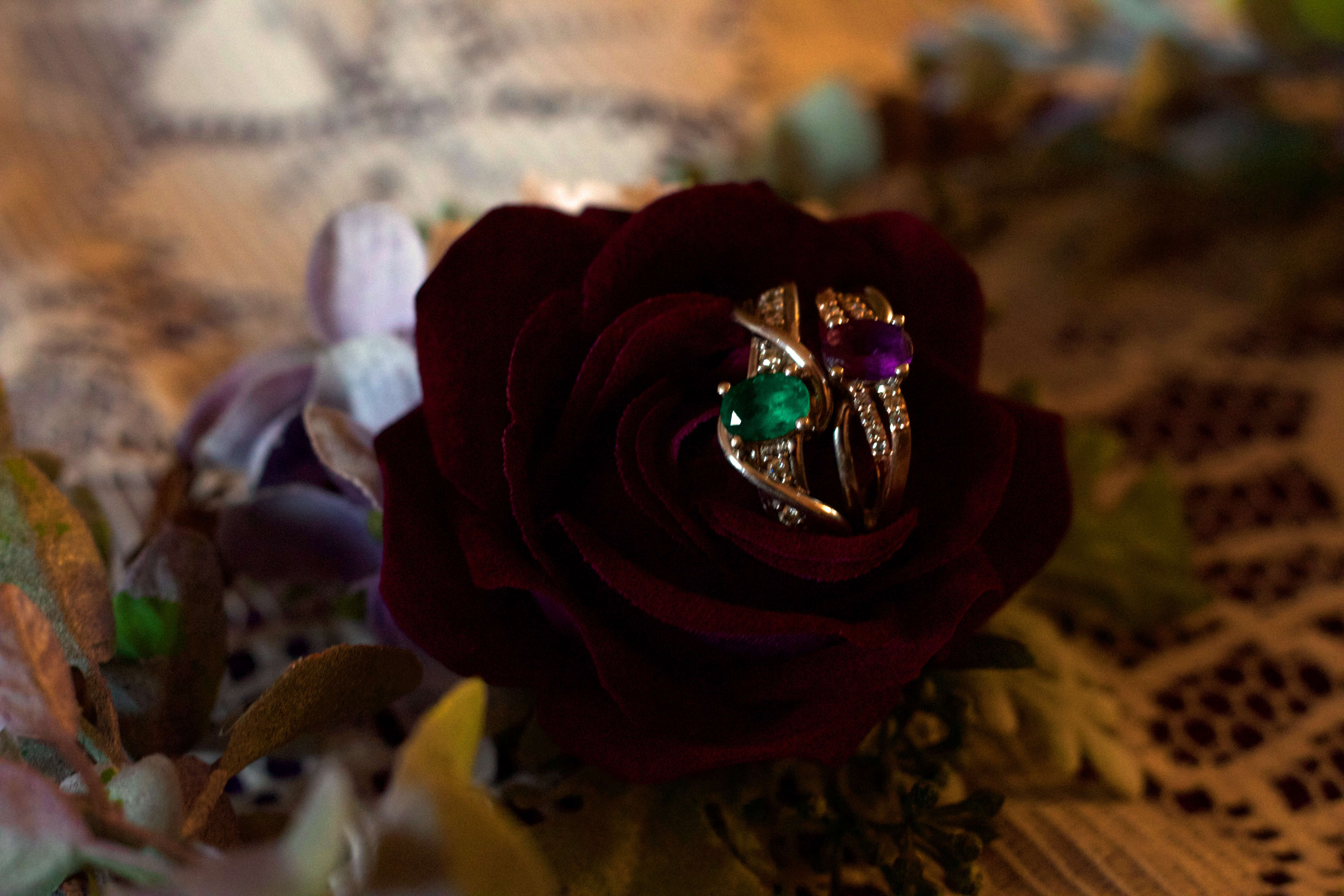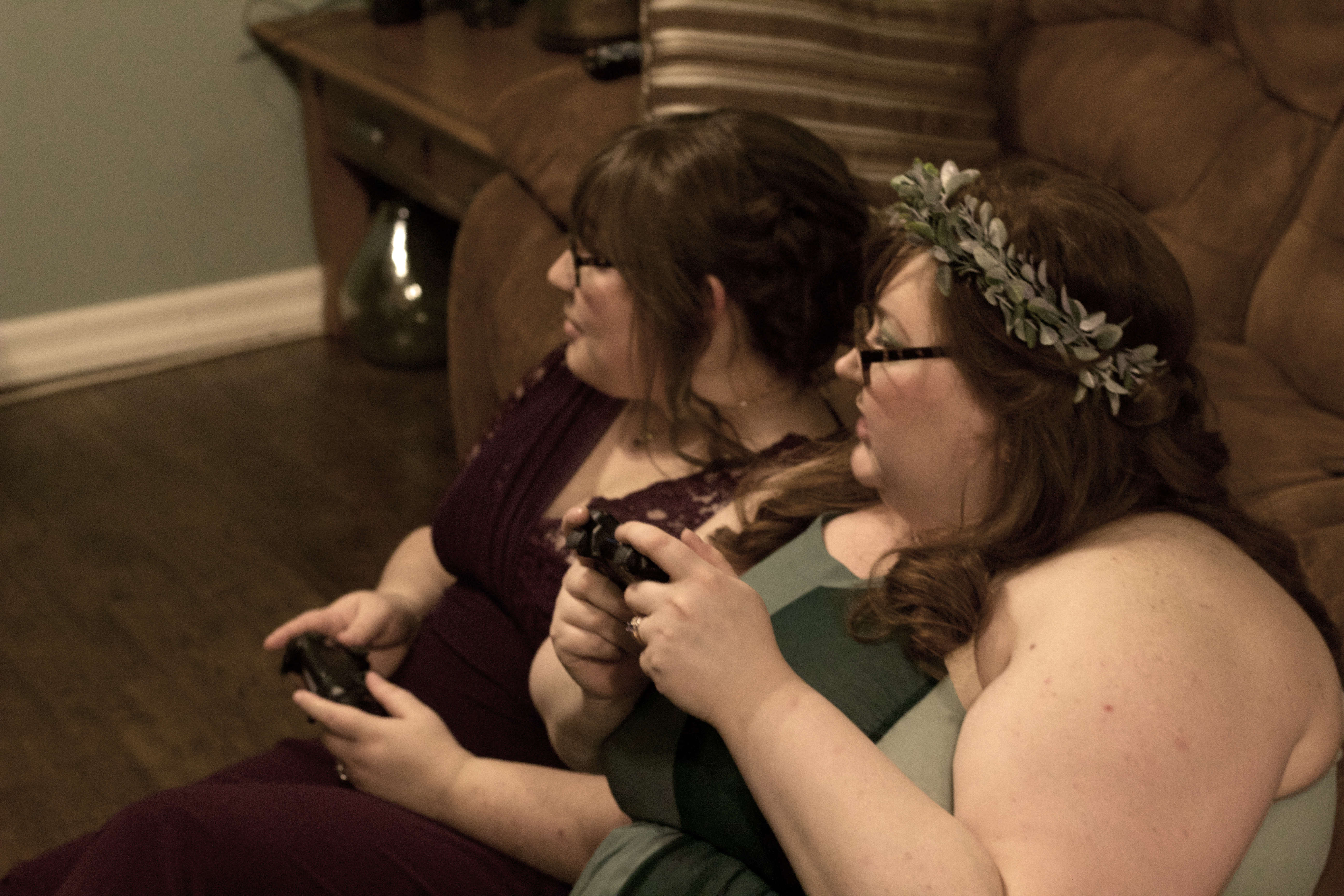Love, Marriage, and Fighting the Good Fight
They say that whenever you talk about politics or religion, you cut your audience in half. However, I write a book series where a closeted bisexual man slowly learns to love and accept himself amid some pretty blatant late capitalism/climate change coded fantasy stuff, so I think I might have already lost the portion of my potential audience who might be offended by the following statement:
The election of President Donald Trump was a hard, hard night for me.
See, November 8th, 2016, was four days before my wedding. To my wife.
I met Elzie in 2004. We were in the same very small fandom, and while our initial meeting was a hilarious cavalcade of fan-community flavoured teenage drama, we very quickly formed a connection that shook both of us down to our toes. We had everything in common, could talk for hours, and were united in our deep love of writing and sharing stories. Fanfiction at first, then original. She got me like no one else ever had. Looking back, I’m pretty sure I was in love with her by the end of the first year of our friendship. But, perhaps because we’re both emotionally stunted goblins, it took us a long time to realize that that’s what it was.
The thing with bisexuality is that it’s confusing.
Growing up in the late 90s and early 2000s in Canada was a crazy time. That was when the gay rights/marriage debate was the topic on everyone’s tongue, the hot button issue of the day. I was raised as a conservative United Baptist, and we were on the front lines of the fight for “traditional marriage” — that is, the fight against marriage equality. Barely a Sunday went by when we weren’t getting a bulletin from the pulpit updating us on the status of the gay debate in Parliament, and one by one, the provinces started legalizing. It was a battle for the soul of the nation, and I was a flustered teenager in the middle of it.
I had a serious boyfriend. I was madly in love with him and incredibly attracted to him. So I knew I was ‘normal,’ and I tried not to give it more thought than that. But I also knew that I could never stop looking at the pretty girl in my Advanced English class, and that I seemed to like the female characters in my favourite books, video games, and animes a lot more than the males…
But it never connected. I had a boyfriend. I liked my boyfriend. I had crushes on actors and I thought Squall from Final Fantasy VIII was so dreamy, and therefore, those thoughts were just, oh, temptations of Satan, or a glitch in the brain-machine, or even just… normal. Something all good, straight girls experienced.
My church and our fellow soldiers lost the fight holding back gay marriage in mid 2005. I’d known Elzie for over a year, I’d just started to feel distant and alienated from my faith, and I was introduced the concept of bisexuality. It was strange and new, but it also made sense to me. Removing the binary thinking from the equation was something I’d never thought of on my own, but almost immediately, it was like I’d seen the light. I started very tentatively identifying as bisexual, though I never imagined acting on it. All around me, the authority figures in my life condemned the triumph of twisted morality. It wasn’t a good time to be queer. And I counted myself lucky. Being bi, if that’s what I was, meant that I could easily pass right under their noses, stealthily appearing straight even though I wasn’t.
But we don’t choose who we fall for. The mere capacity to be in a heterosexual relationship doesn’t mean that that’s what ends up happening. Elzie and I danced around each other for years, dating mutual friends and struggling with jealousy and alienation and failed relationships before we realized what was really going on. We’d joked about being a couple for years, but despite both of us being bi, we’d never considered it seriously until we suddenly realized that we’d been serious all along. By this time, I was out to my family and completely gone from the church. The lingering spectre of the war against the gays in my childhood was long gone, and shortly after we were officially engaged, gay marriage was legalized in Elzie’s home country of America.
We planned to get married at my parents’ house in eastern Canada.

It’s a beautiful home that we built from nothing out in the country. A blueberry field nestled into pine and birch trees used to stand where the house is, now. It has a big living room and an open concept. My younger sister had married her husband there a few years before. It was the perfect location. Neither of us wanted to wear white, so I chose green, her favourite colour, and she wore purple, which is mine. We ordered Christmas lights off Amazon and strung them all over the house. Friends flew in from all around the world, including Meg, who we’d never met in person, who came all the way from Australia.
We went to Starbucks at about 6 PM on the night of the 8th. Things weren’t looking good, but it seemed so obvious at the time that Trump couldn’t win the election. Clinton was a deeply flawed candidate, but Trump was a disastrous one. People around us in the Starbucks joked about moving further north and the world ending, but despite the humour, the atmosphere was tense. We all went back to the house to play board games and pass the time. We were pretty sure Clinton would be president-elect by midnight, and this weird moment in time when a Trump presidency looked possible would be over.
When we checked our phones between games, we got a rude awakening.
And it was tough.
I remember lying on the floor in the living room, staring up at the ceiling. I didn’t know what we were going to do. All of our plans suddenly seemed like they were made of cobwebs. I’d intended to move to the States with Elzie. After all, she’s a successful software developer and I’m just a writer. Would that still be possible? Was there a place for us? I was getting married in four days, and I was back in the early 2000s, when the debates raged and my pastor preached hate.

We got married. It was the best night of my life at the time, and it still is to this day. Drinking champagne, dancing with friends and family into the night, we felt triumphant and powerful and undefeatable.
I’ve held onto that feeling. The last year has been long and challenging. As immigration times stretched longer than they’ve been in years, Elzie and I have been kept apart for longer than any married couple ever should be. I’ve undergone invasive medical examinations. I’ve been asked deeply personal questions. I’ve spent days on planes, in waiting rooms, and on the phone dealing with the bureaucracy of the situation. I’ve seen some truly power-mad people — along with a lot of wonderful, kind, compassionate ones — at all levels of the process. Every time I’ve faltered, I’ve remembered how I felt that night.
We set a rule for the day of the wedding: no talking about Donald Trump. At the time, we thought that he’d hang over everything like a cloud, ruining our day. But in truth, it all seemed a thousand miles away. The thing with the wars of my childhood is that they passed. Progress doesn’t always move at a steady pace, but it always moves forward. In twenty years, I don’t think Elzie and I will remember the shadow the Trump presidency threw over our wedding. We might not even remember Trump, himself.
Today, young bisexuals have more options and more clarity than I did. It gives me hope and joy to think that another eccentric teenage girl might not feel trapped between two binary options, neither of which make sense to her. And on my end, I write bisexual characters and bisexual experiences into my work to capture that moment of time I existed in, when neither of those two limited labels fit and it felt like the world was against me.
I moved to the States, permanently, this week. I’ll write more about my experiences with immigration later — it’s a doozy of a story with a million maddening, heartwarming, and hilarious little details. For the moment, I’m settling into a happy domestic life with my wife of one year. We’ll still be here when Trump is gone, and no matter what comes after him, we’ll face it together. That’s the thing about fighting a battle you’ve already won once, after all. Your adversity-tackling muscles are damn well-honed.